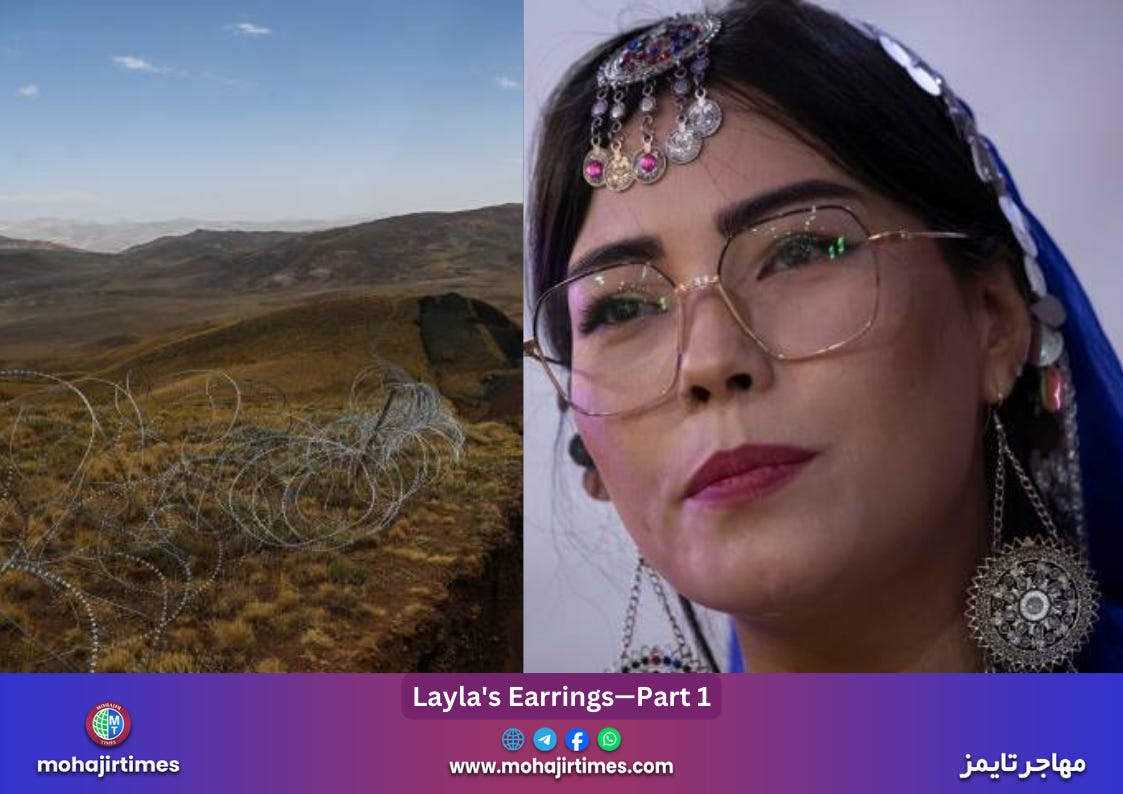Layla’s Earrings—1
She sighed deeply, her almond-shaped eyes welling with tears, and cast a fleeting glance at me. “I have no place left in this wretched land to call home,” she said. “I studied for years
By: Khan Mohammad Hedayat
On August 27, 2021, I joined a caravan of twenty people, mostly women and children, on a Toyota Flan-coach. The morning sun had yet to smile over the mountains of Kabul when we left Dasht-e Barchi, crying. A city that was once a hub of culture, music, poetry, and art had now sunk into the black abyss of ignorance, crime, and extremism, forcing us to flee its grip.
The farther I moved from Kabul, the more I felt my heart being torn apart, wanting to break free from my chest and fly back to the skies over Kabul. All day, we passed through streets draped with white flags, casting an aura of terror on every wall. The night donned its black attire as we traversed a road lined with towering pine trees.
We stopped at the first junction, dimly lit by a few shop lights. An older man with a white beard and a pakol hat sat on a plastic chair outside his shop under the streetlight’s glow. The driver asked him, “How far are we from the Kabul terminal?”
The old man, stroking his long beard to tidy it, replied, “The city center is about twenty kilometers from here. You must be coming from Kabul?”
Then he added, “How long have you been on the road?”
“Twenty hours,” the driver answered.
The shopkeeper, gesturing toward a nearby inn, said, “I can see you’re tired. That inn over there belongs to me. You can stay there tonight and get some rest. We have everything you need—family rooms and delicious meals.” We spent the night there, but contrary to his claims, neither clean rooms nor tasty food were to be found.
Before dawn, the driver’s voice startled me awake. Everyone squeezed into the vehicle as if grappling for air. The sun was beginning to spread its warm kisses over the earth when we saw the city’s entrance gate, inscribed with the words: “City of Nimruz.”
It was my first time entering Nimruz, a city whose lost beauty was evident at first glance. Once vibrant and charming, it now lay shrouded in despair. Everywhere, an air of aimlessness and hopelessness hung heavy. People wandered in every direction as if searching for something precious they had lost. Like Kabul, Balkh, Ghazni, and other cities, Nimruz, too, was cloaked in the ominous shadow of white flags.
At a terminal designated for Flan-coaches, we disembarked. After a brief pause, a companion’s phone rang. Soon after, a middle-aged, frail man appeared from a nearby alley, holding a phone in one hand and a cigarette in the other. After a brief exchange of greetings, he exhaled a puff of smoke and asked us to follow him. Retracing his steps, he led us down a narrow alley to the left. The alley was teeming with bewildered and distressed Afghan men, women, and children—refugees uncertain of their future.
After walking about a hundred meters, we reached a metal gate that blocked the alley. A stylish young man emerged. His name was Abdullah, and his long hair fell over his shoulders in striking waves. “Follow me,” Abdullah said.
He led us through the gate into a corridor flanked by small and large rooms. Heavy curtains hung over the doors and windows, shielding the interiors from outside view. But the scattered shoes outside each door told the story of those within—families who had fled war, now embarking on perilous journeys of illegal migration.
At the end of the corridor, we entered the last door on the left. Inside was a hallway leading to two rooms: one for singles and the other for families. Since I was traveling with families, I entered the family room. A family of four was already there—a man in his fifties, his wife, and their two daughters. The innkeeper, who was also the head of the smuggling operation, stepped in. He counted the individuals and called for Abdullah, whom he introduced as his son. Abdullah entered, carrying a notebook and pen, and registered the names of everyone present. He announced that we would leave for the border that night.
The two sisters sharing the room with me were Layla and Nilofar. Layla, the older sister, carried a visible weight of sorrow on her face as if a mountain of grief had cast its heavy shadow over her, though she never let it show. From our first interaction, I sensed her courage; she was not an ordinary girl.
Curious about her story and the reasons for her displacement and migration, I decided to start a conversation. “Excuse me,” I asked, “why have you chosen this path despite all its dangers?”
She sighed deeply, her almond-shaped eyes welling with tears, and cast a fleeting glance at me. “I have no place left in this wretched land to call home,” she said. “I studied for years, driven by my love for this country. I chose a military career, but last year, I lost my older brother in the Afghanistan National Army. Recently, I secured a position at the Ministry of Interior when…” Her words broke into sobs, cutting her explanation short.
To be continued ...





